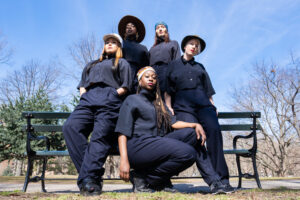COVID death spurs dance residency at Bridge Street Theatre
Tresca Weinstein
March 26, 2021Updated: March 28, 2021 5:14 p.m.

When Tatiana Desardouin creates dance, she doesn’t have to look around her for movement inspiration—she has a vocabulary to work with that is basically limitless.
“Just within street and club dance, there are so many styles, and within each style there’s so much information,” the choreographer said in a recent interview. “Under our umbrella, in our community and culture, there’s so much that it would take a lifetime to explore everything we can do.”
Desardouin’s New York City–based Passion Fruit Dance Company is in residency March 29–April 11 at Bridge Street Theatre in Catskill, and will offer a virtual performance excerpt of their new work, “Trapped,” on April 10 at 7 p.m.
The event is part of a series of dance residencies hosted by Bridge Street founders John Sowle and Steven Patterson, and supported by part-time Catskill residents and arts patrons Duke Dang, general manager of the Works & Process performing arts series at the Guggenheim Museum in Manhattan, and his husband, Charles Rosen.
“What really fueled this was that a very good friend of ours, Anh-Tuyet Nguyen, who was a dancer and dance lover, died of COVID last April, and we wanted to do something to remember and honor her,” Dang said. “By nature of what I do professionally, I knew so many artists that could use these resources of space and time and housing at this moment, so we dreamed up this dance residency. It’s about honoring AT’s memory while also providing a safe harbor for artists to create and inspire and heal us.”
In the case of Passion Fruit, an additional grant allowed Dang to bring the residency into the Works & Process Bubble Residency Program, which has allowed artists to safely create and rehearse together in upstate venues throughout the pandemic. When Desardouin and her dancers leave Catskill on April 11, they will head directly to the Guggenheim to perform “Trapped” live in the museum’s rotunda, as part of one of the first indoor performance series in New York since venues closed a year ago.
“What I’m trying to do personally and professionally is help shape what representation looks like as we emerge,” Dang said. “Street and hip hop dance companies have traditionally not received institutional support, and we wanted to highlight what women are doing in this incredibly rich art form.”
Born in Switzerland of Haitian parents, Desardouin was exposed to the street dance scene through dance battles, parties and club culture, first in Europe and then in New York City, where she visited relatives in the Bronx throughout her childhood. Her time in the States, she said, allowed her to dive deeper into understanding the lineage of these art forms, and their inseparable connection to Black culture and history.
“There would be no hip hop if it wasn’t for slavery, but it tends to be taken out of context and removed from its culture, which is it essence,” she said. “Taking the art form on stage is a challenge because you don’t represent culture on stage, but our bodies are the culture—we are the representation of the culture on stage, through the authenticity of being ourselves.”
After co-founding Continuum, the first hip-hop dance company in Geneva, Switzerland, and opening a hip hop dance school there, Desardouin relocated to New York City in 2016. She founded Passion Fruit with the mission to both perform and educate, and launched the company with the work “Dance Within Your Dance,” showcasing the techniques, rhythms and essence of hip-hop and house dance, and the individual and collective methods through which they are created. Passion Fruit performed the work at venues including the Apollo Theater, Joe’s Pub and Jacob’s Pillow, and Desardouin was selected as one of Dance Magazine’s 2020 “25 to Watch.”
The company’s new piece, “Trapped,” is more challenging, she said, in that it’s more personal, addressing the unique and simultaneously universal experiences of women. Created with her company, which includes dancers LaTasha Barnes, Mai Lê Hô, Nubian Nene, Lauriane Ogay, and Gyeun Jeong Aka Soo, it emerges from the lived experience of the three dancers and explores the obstacles and blocks women face. With music production by Saadiq Bolden, aka Saadiq The Last Musician, the work incorporates both set chorography and freestyle sections that are improvised for each performance.
“I’m using the same tools and vocabulary to express something more personal and respect everybody’s vulnerabilities in the process,” Desardouin said. “As women from different cultures and backgrounds, each one of us [has been] uprooted and brings some challenges with us, and within those challenges there are differences but also a lot of similarities.”
Their collaboration has been an emotional and extremely educational creative process, she says, in which the six dancers have listened closely to each other’s stories and the stories they’ve inherited, while keeping the focus on the art form and its lineage. This anti-racist work is central to the mission of the company.
“We have a very diverse cast, and all of them are really aware of what it means to be part of this community, as guests within this culture,” Desardouin said. “It’s about being an example for people of what it means to be a true participant within a culture and help preserve its heritage and history.”
